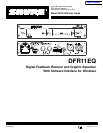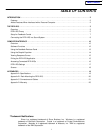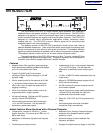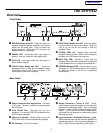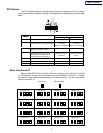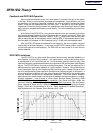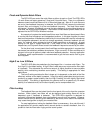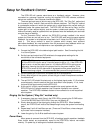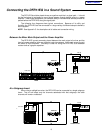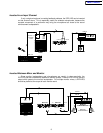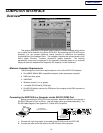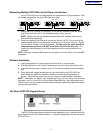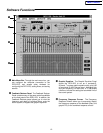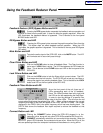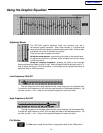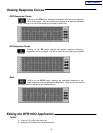
2
INTRODUCTION
The Shure Model DFR11EQ is a single channel signal processor that combines a
feedback
reducer and graphic equalizer in a single, half-rack enclosure. The DFR1
1EQ is
designed to be placed in a sound reinforcement signal path to automatically detect and
control
acoustical feedback and
equalize overall sound system response. The DFR1
1EQ is
designed for installed sound reinforcement applications: theater, conference rooms,
meeting halls, etc. The DFR11EQ is also an effective setup tool for controlling major
feedback
modes in live music applications.
The feedback reducer of the DFR11EQ automatically inserts narrow notch filters at
detected
feedback frequencies.
These notch filters stop a sound system from feeding back,
but
are narrow enough so their ef
fect on audio
quality is minimized. The feedback detection
algorithm
constantly searches for feedback, with or without the presence of program audio.
The
feedback reducer functions on its own or under external computer control.
The
graphic equalizer of the DFR1
1EQ is made up of thirty
1
/
3
-octave, constant Q filters
and
adjustable high pass and low pass filters. The graphic equalizer can be accessed via
computer control with the supplied Windows* interface software.
Features
S
Adaptive Notch Filter algorithm (patent pending)
which automatically detects feedback and deploys
up to 10 narrow band notch filters.
S
Crystal* 20-bit A/D and D/A converters
(Analog-to-Digital, Digital-to-Analog) for 104 dB
dynamic range.
S
48 kHz sampling rate for flat response to 20 kHz.
S
1
/
2
rack space chassis allows rack mounting of
one or two units in a single rack space with no
sagging or bending.
S
Shure Link Interface allows multiple units to be
programmed with a single computer
.
S
No internal batteries. Settings and DSP program
stored in internal EEPROM chip.
S
Electronically balanced input with combination
1
/
4
-in. and XLR connector
. Can be used with
balanced or unbalanced outputs.
S
Independently driven, cross-coupled, balanced
1
/
4
-in. and XLR outputs. Can be used with
balanced or unbalanced inputs, without signal
loss.
S
+4 dBu/–10 dBV DIP-switch-selectable input and
output levels.
S
Motorola* DSP56009 processor engine with full
24-bit internal processing.
S
RS-232 interface for external computer control
and firmware updates.
S
Internal linear power supply switchable between
120 and 240 V
ac eliminates the need for a
cumbersome external power supply
.
S
Meets UL, CSA, VDE, and CE requirements for
safety.
S
Solid state bypass eliminates unreliable
mechanical relays and switches.
Added Features When Interfaced with a Personal Computer
S
Tamper-proof,
constant-Q, 30-band,
1
/
3
-octave
graphic equalizer
.
Can boost up to 6 dB or cut 12
dB for each band.
S
Adjustable 12 dB/octave high pass and low pass
filtering.
S
Front/back panel lockout control.
S
Response Curve V
iewing. Displays frequency
response of the feedback reducer
, graphic
equalizer
, or both.
S
Numerical display of active feedback filter
frequency and depth.
S
Storage of multiple scenes to floppy or hard disk.
Main Menu



